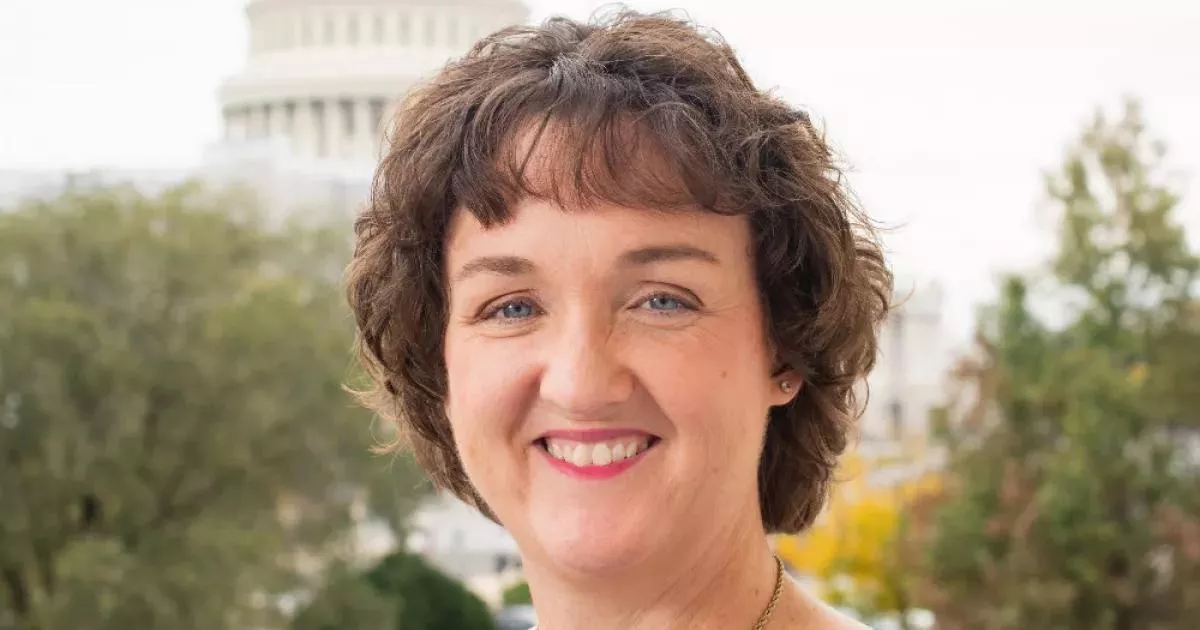Katie Porter is an American politician and lawyer who served as a U.S. Representative for California's 45th congressional district from 2019 to 2025. A member of the Democratic Party, Porter is known for her consumer protection advocacy and her use of whiteboards to illustrate complex financial issues during congressional hearings.
1953: Creation of the District
In 1953 the district was created.
January 3, 1974: Katherine Moore Porter's Birth
On January 3, 1974, Katherine Moore Porter, who later became a U.S. Representative from California, was born.
1996: Graduation from Yale University
In 1996, Katie Porter graduated from Yale University, majoring in American studies. Her undergraduate thesis was titled "The Effects of Corporate Farming on Rural Community."
2001: Graduation from Harvard Law School
In 2001, Katie Porter graduated magna cum laude with her Juris Doctor from Harvard Law School, where she studied under Elizabeth Warren.
2003: Married Matthew Hoffman
In 2003, Katie Porter married Matthew Hoffman, and they have three children together.
2005: Joined the University of Iowa College of Law
In 2005, Katie Porter joined the faculty of the University of Iowa College of Law as an associate professor.
2008: Testified Before House Subcommittee
In 2008, Katie Porter testified before the House Subcommittee on Financial Institutions and Consumer Credit, alongside Elizabeth Warren, regarding a proposed Credit Cardholders' Bill of Rights.
2011: Became a Full Professor at University of Iowa and Tenured Professor at UC Irvine
In 2011, Katie Porter became a full professor at the University of Iowa College of Law and also became a tenured professor at the University of California, Irvine School of Law.
2011: Purchased residence at UC Irvine
In 2011, Katie Porter bought a four-bedroom residence on the University of California, Irvine, campus within the University Hills faculty and staff housing community, which provided below-market pricing.
March 2012: Appointed Independent Monitor by California Attorney General
In March 2012, California Attorney General Kamala Harris appointed Katie Porter as the state's independent monitor of banks in a nationwide $25 billion mortgage settlement.
2013: Filed for divorce from Matthew Hoffman
In 2013, Katie Porter filed for divorce from Matthew Hoffman, which led to a contentious process where both sought anger management, and Porter obtained a protective order against Hoffman.
2015: Consulted for Ocwen
In 2015, Katie Porter consulted for Ocwen.
2016: Hillary Clinton carried the 45th District
In 2016, Hillary Clinton carried the 45th District.
2016: Published "Modern Consumer Law" Textbook
In 2016, Katie Porter's textbook "Modern Consumer Law" was published, addressing consumer laws in light of Dodd-Frank and the Consumer Financial Protection Bureau.
2016: Americans voted by mail
In August 24, 2020, Katie Porter questioned Postmaster General Louis DeJoy. He admitted to her that he did not know the how many Americans voted by mail in the 2016 elections.
April 2017: Announced Candidacy for Congress
In April 2017, Katie Porter announced her candidacy for Congress in California's 45th congressional district against Mimi Walters.
May 2018: Democrats Confident They Would Oust Walters
In May 2018, Politico reported that Democrats were confident they would oust Walters, Porter stated that "Orange County families are very concerned about what Donald Trump is doing" and "Mimi Walters votes with Trump over and over and over again."
June 2018: Advanced to the General Election
In June 2018, Katie Porter finished second in the primary and advanced to the general election.
November 6, 2018: General Election Against Mimi Walters
On November 6, 2018, Katie Porter faced off against Mimi Walters in the general election. Walters initially led, but Porter eventually overtook her as more ballots were counted. Walters alleged unsubstantiated voter fraud.
November 15, 2018: Associated Press Called the Race for Porter
On November 15, 2018, the Associated Press called the race for Katie Porter, marking the first Democratic victory in the district since its 1953 creation. Following her win, Porter pledged to reform campaign finance laws and highlighted her refusal of corporate PAC donations in her campaign.
2018: Stopped teaching at UC Irvine
After being elected in 2018, Katie Porter stopped teaching at UC Irvine but was granted no-pay leave, allowing her to maintain her campus residence.
2018: Elected to Congress
In 2018, Katie Porter was elected to Congress as part of a Democratic wave in Orange County, flipping the 45th district.
2018: Stopped accepting corporate PAC donations
Since 2018, Katie Porter has refused to accept campaign donations from corporate political action committees (PACs) and supported H.R.1, which aimed to overturn the Supreme Court's Citizens United decision.
March 2019: Introduced the "Help America Run Act"
In March 2019, Katie Porter introduced the "Help America Run Act" (H.R.1623), aimed at allowing candidates to use campaign funds for healthcare, elder care, child care, and dependent care expenses.
March 2019: Questioned Wells Fargo CEO Tim Sloan
In March 2019, Katie Porter questioned Wells Fargo CEO Tim Sloan, arguing that he contradicted his lawyers' "corporate puffery".
April 2019: Questioned JPMorgan Chase CEO Jamie Dimon
In April 2019, Katie Porter questioned JPMorgan Chase CEO Jamie Dimon.
May 2019: Questioned Housing and Urban Development Secretary Ben Carson
In May 2019, Katie Porter asked Housing and Urban Development Secretary Ben Carson about "REOs", real estate owned properties.
June 2019: Supported Impeachment Inquiry
In June 2019, Katie Porter became one of the first Democrats in a swing district to support an impeachment inquiry following Robert Mueller's Special Counsel investigation.
October 2019: "Help America Run Act" Passed in the House
In October 2019, the "Help America Run Act" which was introduced by Katie Porter, successfully passed in the House of Representatives, though it did not advance in the Senate.
2019: Co-sponsor of the Equality Act
In 2019, Katie Porter was a co-sponsor of the Equality Act and voted in favor of H.R. 5, which passed in the House, but failed in the Senate.
March 2020: CDC Director Committed to Free COVID-19 Testing
In March 2020, Centers for Disease Control and Prevention director Robert R. Redfield committed to free COVID-19 testing during questioning by Katie Porter.
August 24, 2020: Questioned Postmaster General Louis DeJoy
On August 24, 2020, Katie Porter questioned Postmaster General Louis DeJoy. He admitted to her that he did not know the cost of mailing a postcard or a smaller greeting card, the starting rate for U.S. Priority Mail.
December 2020: Questioned Treasury Secretary Steve Mnuchin
In December 2020, Katie Porter questioned United States Secretary of the Treasury Steve Mnuchin over COVID-19 relief funding.
2020: Echoing Trump's refusal to accept his 2020 loss.
After her loss in the primary, Porter said the election had been "rigged" against her. Her use of the word "rigged" triggered backlash from some Democrats, who condemned her language for echoing former president Trump's refusal to accept his 2020 loss.
2020: Accusation against UnitedHealth during the COVID-19 pandemic
In 2020, Katie Porter criticized UnitedHealth for allegedly prioritizing profits over patients during the COVID-19 pandemic and sent a congressional letter accusing them of reducing provider networks and decreasing reimbursement rates.
2020: Co-Chair of Elizabeth Warren's Presidential Campaign
In 2020, Katie Porter served as one of three co-chairs of Elizabeth Warren's presidential campaign.
2020: Voted for the No-Surprise Act
In 2020, Katie Porter voted in favor of the No-Surprise Act, which aimed to protect patients from unexpected medical bills by prohibiting providers from billing for costs denied by insurance companies.
January 2021: Removed from Financial Services Committee
In January 2021, Katie Porter was removed from the Financial Services Committee and opted to serve instead on the House Natural Resources and House Oversight committees. On the Oversight committee, Porter participated in an investigation into the National Highway Traffic Safety Administration (NHTSA)'s test standards for children's car seats and boosters side-impact.
July 2021: Video Resurfaced of Porter Shouting at Employee
In October 2025, a video of an online interview from July 2021 between Jennifer Granholm and Katie Porter resurfaced where Porter shouted at an employee "Get out of my fucking shot!".
2021: Pushed for additional funding for the Every Kid Outdoors program
In 2021, Katie Porter advocated for increased funding for the National Park Service's Every Kid Outdoors program to enhance children's access to national parks.
2021: Voted in Favor of H.R. 5
In 2021, Katie Porter voted in favor of H.R. 5, which passed in the House, but failed in the Senate.
January 13, 2022: Urged FDA to End Blood Donation Policy
On January 13, 2022, Katie Porter urged the Food and Drug Administration to end a policy that prevented sexually active gay and bisexual men from giving blood donations.
June 2022: Voted in Line with Biden's Position
As of June 2022, Katie Porter had voted in line with Joe Biden's stated position 98.2% of the time.
2022: Supported and Voted for Respect for Marriage Act
In 2022, Katie Porter supported and voted in favor for the Respect for Marriage Act.
2022: Reelected in the 47th Congressional District
In 2022, after redistricting, Katie Porter was reelected in the 47th congressional district.
2022: Criticized pharmaceutical companies for stock buybacks
In 2022, during an interview with Yahoo Finance, Katie Porter criticized pharmaceutical companies for prioritizing stock buybacks over research and development and addressed the high cost of pharmaceuticals, advocating for government negotiation of drug prices to create a more competitive market.
January 10, 2023: Announced Candidacy for U.S. Senate in 2024
On January 10, 2023, Katie Porter announced her candidacy in the 2024 election for the U.S. Senate from California. She raised over $1 million in donations in the 24 hours after announcing her candidacy.
January 2023: Criticism of Porter's Management
In January 2023, Politico reported on criticism that Katie Porter was "allegedly a terrible—according to some accounts, abusive and racist—boss." The accusations include allegations that she used racist language and "ridiculed people for reporting sexual harassment".
February 2023: Called to end blockade of Nagorno-Karabakh
In February 2023, Katie Porter called on the Biden administration to immediately end the blockade of Nagorno-Karabakh and cease all U.S. military aid to Azerbaijan, emphasizing the need to hold Azerbaijan accountable for its aggression against the Armenian people.
April 2023: Porter Defended Herself on The View
In April 2023, in response to allegations that she created a toxic workplace, Katie Porter defended herself on The View by comparing herself to women of color who are discriminated against.
August 2023: Joined SAG-AFTRA and WGA picket line
In August 2023, Katie Porter joined the SAG-AFTRA and WGA picket line outside Paramount Studios, expressing solidarity with the workers and emphasizing the right to bargain.
September 2023: Advocated for an "all of the above" energy approach
In September 2023, during an interview with Fox 5 San Diego, Katie Porter emphasized California's need for an "all of the above" energy approach, advocating for a gradual transition from fossil fuels to greener energy sources without leaving workers behind.
December 2023: Called for a ceasefire in the Gaza war
In December 2023, Katie Porter called for a ceasefire in the Gaza war after Hamas is removed "from operational control of Gaza" and blamed Hamas for the "shortages of food, clean water, fuel and medicine" over the years in Gaza.
2023: Announced Candidacy for U.S. Senate
In 2023, Katie Porter announced her candidacy for the U.S. Senate, forgoing reelection to the House of Representatives.
2023: Claimed US allowed terrorism to flourish
In 2023, Katie Porter claimed that "the United States has allowed terrorism to flourish, and it's refused to take a strong enough stance against Iran".
2023: Endorsed the "America the Beautiful" initiative
In 2023, Katie Porter endorsed the Biden administration's "America the Beautiful" initiative, supporting its goals for conservation and outdoor access.
2023: Supported Court Expansion Legislation
In 2023, Katie Porter showed her support for more stringent codes of conduct for Supreme Court justices and for court reform and expansion, by attending a statewide bus tour organized by Demand Justice in support of legislation that would expand the court to 13 justices.
2023: Reported as Episcopalian
In 2023, the Pew Research Center reported that Katie Porter identifies as an Episcopalian.
February 2024: Called for decommissioning Diablo Canyon Power Plant
In February 2024, during a Senate campaign debate, Katie Porter advocated for the decommissioning of the Diablo Canyon Power Plant.
June 2024: Comments on White House Response to Biden's Debate Performance
In June 2024, following the presidential debate, Katie Porter stated that the White House "clearly fumbled" its response to the criticism surrounding President Biden's performance and suggested the need for changes in advisors or campaign strategy.
2024: Senate Campaign and Housing Crisis Stance
During her 2024 Senate campaign, Katie Porter blamed the housing crisis on "Wall Street". She supports increased funding for section 8 vouchers and an increase in the low-income housing tax credit.
2024: Candidacy in the 2024 election for the U.S. Senate
In January 10, 2023, Katie Porter announced her candidacy in the 2024 election for the U.S. Senate from California.
January 2025: Porter Will Leave Congress
By January 2025, Katie Porter will leave Congress, as she did not seek reelection to her House seat and failed to advance from the primary.
March 11, 2025: Announced Entry into 2026 Gubernatorial Race
On March 11, 2025, Katie Porter announced that she would be entering California's 2026 gubernatorial race.
October 8, 2025: Threatened to Walk Out of Interview
On October 8, 2025, Katie Porter threatened to walk out of an interview with CBS News Sacramento Correspondent Julie Watts after being questioned about what she would say to Californians who voted for Donald Trump, leading to criticism from politicians.
October 2025: Video Resurfaced of Porter Shouting at Employee
In October 2025, a video of an online interview from July 2021 between Jennifer Granholm and Katie Porter resurfaced where Porter shouted at an employee "Get out of my fucking shot!".
2026: Candidate for Governor of California
In 2026, Katie Porter is a candidate for governor of California.
2026: California's 2026 gubernatorial race.
On March 11, 2025, Katie Porter announced that she would be entering California's 2026 gubernatorial race.
Mentioned in this timeline

Elizabeth Warren is a prominent American politician and the senior...

Joe Biden is an American politician who served as the...

Kamala Harris is an American politician and attorney She served...

Wells Fargo Company is a multinational financial services institution operating...
California is a U S state on the Pacific Coast...

Benjamin Solomon Carson Sr is a retired American neurosurgeon who...
Trending

28 minutes ago Arthur Fils Competes in ATP 500 Doha Against Kamil Majchrzak and Others.
28 minutes ago Iowa and Nebraska clash in football and basketball; Sandfort nears record.

29 minutes ago Tyra Banks and America's Next Top Model's Controversies Revisited in Netflix Documentary

1 hour ago Dolphins Release Bradley Chubb, Two-Time Pro Bowler, After Four Years

1 hour ago Kandi Burruss and Todd Tucker face divorce drama: rent, childcare costs disputes rise.

1 hour ago Dove Cameron's link to chilling murders, new streaming roles on Netflix, Apple TV.
Popular

Kid Rock born Robert James Ritchie is an American musician...
Randall Adam Fine is an American politician a Republican who...

Pam Bondi is an American attorney lobbyist and politician currently...

Barack Obama the th U S President - was the...
The Winter Olympic Games a major international multi-sport event held...

XXXTentacion born Jahseh Dwayne Ricardo Onfroy was a controversial yet...
